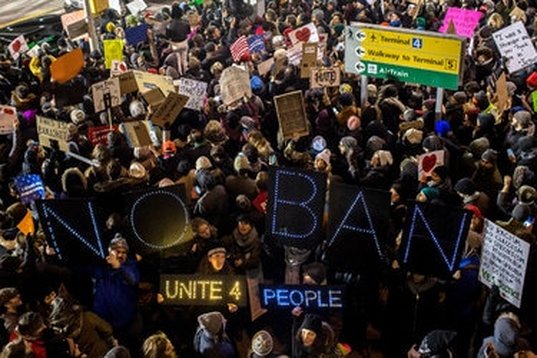U.S. Travel Ban: Supreme Court Lifts Lower Courts Iron Cast Embargo
June 26 2017 By Abiodun Giwa
 Part of the mass demonstrations against the ban in March 2017 (Courtesy:New York Times)
Part of the mass demonstrations against the ban in March 2017 (Courtesy:New York Times)
The United States' government achieved victory on Monday following Supreme Court's favorable decision on the travel ban, which lower courts embargoed in its entirety.
The court also said that the government can resume provisions of of ban that are allowed immediately.
However, the court's condition for the ban says that the ban will be revisited in October to determine whether to embargo it or not.
Aside from the victory, which the court pronouncement means for the government, it is also a victory for commentators, who have cried aloud that President Donald Trump has the constitutional power to bare people entering the country for a period of time.
And that no one entering the country for the first time without established bona-fide relationship in the country, has the constitutional right of entry.
The New York Times report said, "The justices, in effect, said that foreigners with ties or relationships in the United States would not be prohibited from entering the country. But, those applying for visas who had never been here, or had no family, business or other ties could be prohibited."
The BBC reports: "The Supreme Court said in Monday's decision: "In practical terms, this means that [the executive order] may not be enforced against foreign nationals who have a credible claim of a bona fide relationship with a person or entity in the United States. All other foreign nationals are subject to the provisions of [the executive order]. The ruling also said it would permit a 120-day ban on all refugees entering the US to go into effect, allowing the government to bar entry to refugee claimants who do not have any "bona fide relationship" with an American individual or entity."
Hell was let loose in January, when the Trump administration rolled out a travel ban for travellers coming from seven Arab countries, announced by government as targeted to protect the country from terrorism. The opposition party and the liberals said that the ban was targeted toward Muslims, and they worked to make the executive order difficult to operate, using certain inconsistencies in the letters of the order, which failed to say how it will affect permanent residents from affected countries, along with mass demonstrations mostly at airports in the country. The government said consistently that the ban was not targeted against Muslims and it was not discriminatory, but address the evil of terrorism.
Attorney Generals went to court in some states to stop the operation of the order. And they won. The government's efforts to get the order back in operation suffered setbacks in Appeal Courts, despite correcting inconsistencies that were in the order, when it was first released.
Apparently, the order does not affect permanent residents and others who are visa holders, who have relations in the country and they are coming from the affected countries like Syria, Yemen, Iraq, Iran, Somalia, Libya and Sudan.
The court also said that the government can resume provisions of of ban that are allowed immediately.
However, the court's condition for the ban says that the ban will be revisited in October to determine whether to embargo it or not.
Aside from the victory, which the court pronouncement means for the government, it is also a victory for commentators, who have cried aloud that President Donald Trump has the constitutional power to bare people entering the country for a period of time.
And that no one entering the country for the first time without established bona-fide relationship in the country, has the constitutional right of entry.
The New York Times report said, "The justices, in effect, said that foreigners with ties or relationships in the United States would not be prohibited from entering the country. But, those applying for visas who had never been here, or had no family, business or other ties could be prohibited."
The BBC reports: "The Supreme Court said in Monday's decision: "In practical terms, this means that [the executive order] may not be enforced against foreign nationals who have a credible claim of a bona fide relationship with a person or entity in the United States. All other foreign nationals are subject to the provisions of [the executive order]. The ruling also said it would permit a 120-day ban on all refugees entering the US to go into effect, allowing the government to bar entry to refugee claimants who do not have any "bona fide relationship" with an American individual or entity."
Hell was let loose in January, when the Trump administration rolled out a travel ban for travellers coming from seven Arab countries, announced by government as targeted to protect the country from terrorism. The opposition party and the liberals said that the ban was targeted toward Muslims, and they worked to make the executive order difficult to operate, using certain inconsistencies in the letters of the order, which failed to say how it will affect permanent residents from affected countries, along with mass demonstrations mostly at airports in the country. The government said consistently that the ban was not targeted against Muslims and it was not discriminatory, but address the evil of terrorism.
Attorney Generals went to court in some states to stop the operation of the order. And they won. The government's efforts to get the order back in operation suffered setbacks in Appeal Courts, despite correcting inconsistencies that were in the order, when it was first released.
Apparently, the order does not affect permanent residents and others who are visa holders, who have relations in the country and they are coming from the affected countries like Syria, Yemen, Iraq, Iran, Somalia, Libya and Sudan.

